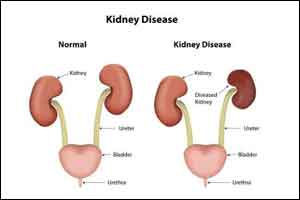- Home
- Editorial
- News
- Practice Guidelines
- Anesthesiology Guidelines
- Cancer Guidelines
- Cardiac Sciences Guidelines
- Critical Care Guidelines
- Dentistry Guidelines
- Dermatology Guidelines
- Diabetes and Endo Guidelines
- Diagnostics Guidelines
- ENT Guidelines
- Featured Practice Guidelines
- Gastroenterology Guidelines
- Geriatrics Guidelines
- Medicine Guidelines
- Nephrology Guidelines
- Neurosciences Guidelines
- Obs and Gynae Guidelines
- Ophthalmology Guidelines
- Orthopaedics Guidelines
- Paediatrics Guidelines
- Psychiatry Guidelines
- Pulmonology Guidelines
- Radiology Guidelines
- Surgery Guidelines
- Urology Guidelines
Contrast agents considered safe in angiography don't actually prevent acute kidney failure

Treatments commonly used to prevent acute kidney failure and its complications arising from common angiography procedures make no difference to health outcomes, a major new study has found.
A team of international researchers studied the effectiveness of two common treatments used to prevent serious harm to patients undergoing angiography.
The worldwide study published in the New England Journal of Medicine investigated the effects of sodium bicarbonate and -N-acetylcysteine and found that neither was any better than using saline alone. These treatments were thought to reduce the impact of the contrast agents used in angiography upon kidney function, having been studied and used for over 15 years.
Lead author Dr. Steven Weisbord, of the Veteran's Administration, said: "Both of these treatments are used in hospitals all over the world with the belief that they are helping patients. The scientific evidence to support such practice has been confusing, so the use of these treatments varies between hospitals and individual doctors.
Co-author Assoc Prof Martin Gallagher, of The George Institute for Global Health, added: "This definitive study has shown that these treatments are not helping people avoid acute kidney failure nor the other poor outcomes that result from this complication. In addition, they are adding unnecessary complexity and cost."
Millions of these angiograms are performed around the world annually, with some 76,000 heart-related angiograms done in Australia every year. Patients who have a history of kidney disease, heart failure or diabetes have a higher risk of these complications, which are associated with longer hospital stay, higher mortality and worsening of kidney function.
Dr. Weisbord said: "Whilst these treatments do not appear to cause harm, our results suggest that patients should instead just be treated with saline which is both cheaper and more readily available."

Disclaimer: This site is primarily intended for healthcare professionals. Any content/information on this website does not replace the advice of medical and/or health professionals and should not be construed as medical/diagnostic advice/endorsement or prescription. Use of this site is subject to our terms of use, privacy policy, advertisement policy. © 2020 Minerva Medical Treatment Pvt Ltd